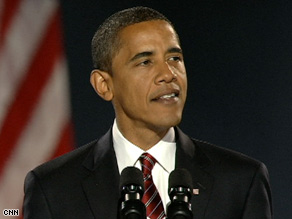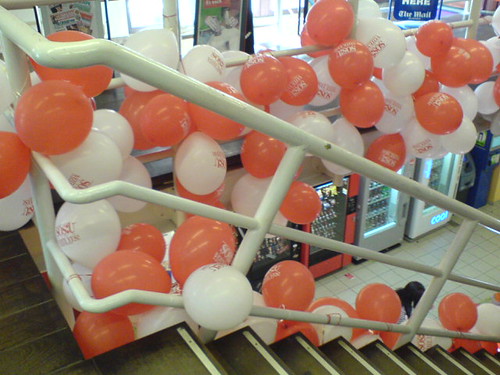
As you can see from the result above, the Illinois Senator Barack Obama was elected to be the next President of the United States. He will start that job on January 20th, 2009.
Results breakdown
Here is a graphical representation of who won each state:

Here is a simple breakdown of the numbers
| Choice | No. states |
| Democrat | 28 |
| GOP | 21 |
| Incomplete | 2 |
The result above is about electoral college votes and that's what decided who won the states. Remember that the votes of the people don't count in the US, although it's expected that the members of the Electoral College assigned to each state will vote the way the people do. It hasn't always happened like that though (have a look at the results from the 2000 Gore vs. Bush election).
Big switch
One of the most interesting facts from this result is that nine states switched there support and in all cases it was from GOP (the Republicans) to Democrat. Those states included Florida, an important state in 2000 and has been Republican for a number of years. It was an area that Rudy Giuliani concentrated on heavily when he was campaigning.
What reasons could there be for the big switch in those nine states? Well, there are several possibilities. A campaign theme for McCain was based around fear (because of the terrorist attacks). Maybe Obama's message of hope was more appealing. The VP picks have been frequently analysed and maybe the gaffes of Sarah Palin were a factor.
Exit poll analysis
The exit polls on CNN reveal some interesting information about the way people voted. Some of it is stating the obvoius, but it's better when it's confirmed with numerical data.
It seems a large proportion of John McCain's votes came from the older white population. Obama dominated the young and non-white demographics. As an example, 55% of the white population voted for McCain and a spectacular 94% of African-Americans went for Obama. Another example is that McCain got 53% of the 65 and older demographic.
This goes to confirm that age and race still play a major part in the election. It's worrying, but not unexpected.
Speeches
The following is Barack Obama's victory speech:
This is the sort of speech that Obama has been giving throughout the camapign. Although it is full of inspirational talk and essentially a message of hope and change, it doesn't give us anything new.
Lack of detail in speech
He doesn't go into specifics about all his policies either. A criticism of him has been that he hasn't done that thorughout his campaign. However, I believe he has - for example, he has a plan for improving national security freely available on his website and it contains budget figures, military numbers and deadlines. Also, he can give us more detail when he actually gets into the Whitehouse because then he'll have access to more information.
GOP defeat
John McCain was gracious in defeat, saying that he now hopes that America can move forward:
"This is an historic election, and I recognize the special significance it has for African-Americans and the special pride that must be theirs tonight"
"These are difficult times for our country. And I pledge to him tonight to do all in my power to help him lead us through the many challenges we face."International recognition
There were many leaders who congratulated Obama on his victory - but then that's to be expected. They want to have good relationships with one of the most powerful nations on earth. It's something that's been done over many years. Here is what Gordon Brown had to say:
"I hope to be able to work with Senator Obama to bring the world together so that we can face these difficult times with more coordination and more unity than we've seen before."Problems
It seemed to be a relatively smooth election day. The only problems that were reported mainly focused on long queues and faulty e-voting systems. The queues are unavoidable, but they could be minimised if more polling stations and voting booths were made available. It's a simple formula. The availability of voting machines cannot be based on the turnout of a previous election because it doesn't take into account the candidates and the current public feeling towards politics and other current affairs.
E-voting was something heavily criticised in previous elections and it is something that I've blogged about before, but providing more research and development is done, it can work.
Summary and conclusion
It has been a very long election process. Most people will agree that it has been too long. There needs to be some reform in this area soon. The scheduling of primaries needs to be worked on too - entire states were robbed of the delegates that would normally go to the party conventions where the presidential candidates are announced.
It has also been heavily money-driven. There were several stories in the media about campaign funding. Several people support the idea of a funding cap. It's something I agree with because if everyone has the same amount of money, it shifts the focus from finances and onto the important politics.
Despite all that, I believe a high calibre candidate has been elected as President and hopefully his promise of change will be reality during his tenure (whether it's four or eight years).
So, what do you think?
Technorati tags: Politics, US Election, John McCain, Barack Obama, Government,




